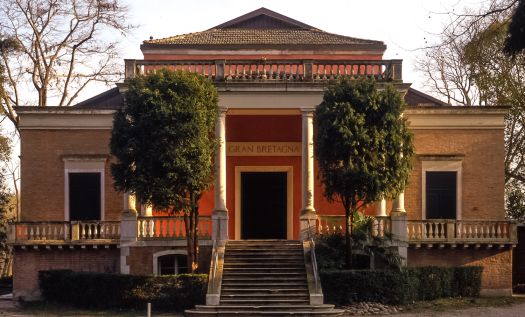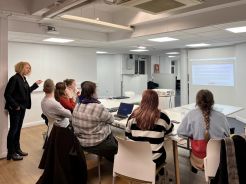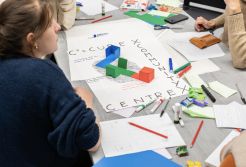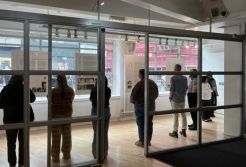Elysia Lukoszevieze talks about her rewarding Fellowship experience
13 September 2022
MA Contemporary Curating student has been awarded Venice Fellowship by the British Council...
The Venice Fellowships programme is a unique opportunity for students to spend a month to fulfil their international ambitions in developing their practice and curatorial skills internationally in Venice during the world’s most important art event. The Fellowship also aims to support students to explore how to work internationally while providing them with a platform to engage with the Venice Biennale to research and develop new connections with curators, critics, artists, and professionals working cross the UK and internationally.

Manchester School of Art is a partner institution in the British Council's Venice Fellowships programme.This distinctive Fellowships opportunity offers the Fellows to have the chance to conduct their independent research in and around Venice and enhance their current studies and professional practice.
Elysia joined us in this interview to talk about her residency experience as well as her academic experience with her studies, conducted by Dr Gulsen Bal (Programme Leader in MA/MFA Contemporary Curating).
Gulsen: Could you please tell us about yourself and your experience with your academic studies on the MA Contemporary Curating programme at Manchester School of Art?
Elysia: I moved to Manchester for the MA programme after having studied Fine Art in Leeds and taking a couple years out to live in London. The course gave me the fantastic opportunity to broaden my knowledge and experience of curating, offering me avenues to meet other creatives in Manchester and work on my own projects in the city.
Gulsen: Candidates are selected through a competitive application process... So, can you tell us about your research project and what motivated you to apply to this specific international Fellowship?
Elysia: My original research project was linked to the curatorial research I was undertaking on my MA around the audience experience of art and how this can feed into the ongoing longevity and interpretation of work. However, once I started researching more into Venice as a city, it’s residents and as a site for contemporary art I was drawn to its limited green spaces and their relationship to the people who inhabit the island. This was in part due to my own experience of the pandemic and how such spaces became integral to my own wellbeing during the lockdown, and also due to the location of the Biennale in one of Venice’s largest parks – the Giardini. My research looked to explore the intangible and poetic rhythms of Venice’s green spaces, and the ways in which they are occupied, shared and transformed by the people who visit them. During my stay I became entranced with the park right at the very tip of the island on Sant Elena – this developed into a documentary project of people’s movements and behaviours within the park and research into the umbrella pine trees that grow there. This project is ongoing, and I am working on a publication that documents the abstract relationship between the people and trees in the park.
I was motivated to apply due to the unique opportunity the Fellowship offered me – being able to integrate myself in a new city so vastly different from anywhere I have lived before was a truly beneficial experience to my own self growth. The enormous amount of art so widely available to me throughout my stay was incredible and by staying there for a whole month I could experience the Biennale at my own pace and digest each exhibition and event without pressure. Additionally, working with other young creatives from across the UK in the British Pavilion allowed me to share my ideas and form new friendships across the country.
Gulsen: What are the benefits of spending a month in Venice during the world’s most important art event and what did you hope to achieve through this unique fellowship opportunity?
Elysia; The most beneficial aspect of staying in Venice for a whole month was time. The ability to visit and revisit exhibitions around my shifts at the British Pavilion offered me the opportunity to truly absorb and interrogate the ideas present within the works, something I have rarely been able to do previously. Whilst working at the British Pavilion I was also able to talk to countless visitors to the Biennale and share in interesting discussions around the Sonia Boyce exhibition, the other pavilions and the visitors’ experiences of the city as a whole. I hoped to be able to immerse myself in a new city, meet new people and give myself the time and opportunity to work on a new body of research that was not tied to my studies – I definitely achieved all of those things.
Gulsen: Has this been a formative and inspirational experience? Also, how has this impacted on your curatorial thinking?
Elysia: This has definitely been a formative and inspirational experience – one that has given me the drive to eventually move abroad and pursue a career in Europe. It has also given me further confidence in myself and my curatorial practice, opening me up to inventive ways of curation and art making. Initially the Biennale felt overwhelming, but the longer I spent exploring the main exhibitions, pavilions and collateral events, the more I understood the immense curatorial challenge such an event poses.



